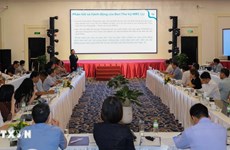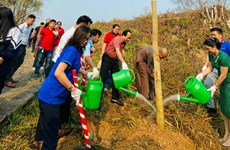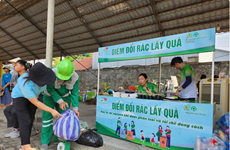Enterprises buries stale milk in landfill, say police
A waste treatment company in Binh Duong
province allegedly buried thousands of tonnes of expired milk as
landfill instead of treating it as contracted, according to police from
the National Department of Environment's southern office.
A waste treatment company in Binh Duong
province allegedly buried thousands of tonnes of expired milk as
landfill instead of treating it as contracted, according to police from
the National Department of Environment's southern office .
Friestland Campina Vietnam Co had contracted the Waste Treatment Enterprise, a subsidiary of Binh Duong Water Supply – Sewage and Environment Company, to dispose 2,060,136 cartons of milk through its waste treatment plant. The value of the contract was 20 billion VND (1 million USD).
Police visited a landfill area used by the Waste Treatment Enterprise on Wednesday morning and uncovered thousands of expired milk still in cartons.
Friestland Campina Vietnam signed the contract with the Waste Treatment Enterprise on May 3 to treat 15,500 tonnes of milk.
The contract allegedly specified that the enterprise should collect the milk at the Friestland Campina Vietnam warehouse in VSIP II Industrial Park in Binh Duong province and separate the milk waste from the cardboard and plastic waste at the site.
It also contracted the enterprise to transport the milk waste for treatment at its treatment plant and separately burn the cardboard containers, plastic wrap and straws.
Police said both the out-of-date milk and containers should have been treated as hazardous waste.
Jan Wegennar, production manager of Friestland Campina Vietnam , told Tuoi Tre (Youth) newspaper the contract stated clearly that the milk had to be separated from solid waste and transported for waste treatment at the enterprise.
If the waste was dumped in the landfill area, it was a breach of the contract, he said.
Huynh Minh Tu, a truck driver who transported the milk, said he saw some of the milk being transported to the treatment plant while some of it was transported to the landfill.
Police also reported other hazardous solid waste had been burned at the landfill area.
Nguyen Thanh Phong, the enterprise's deputy manager, said the waste caught fire accidentally because of the hot weather.
He said dumping hazardous solid waste at landfill sites intended for household waste was "common at every landfill site."
Professor Le Huy Ba, director of the HCM City Institute of Science, Technology and Environment Management, told Nguoi Lao dong (The Labourer) newspaper the milk dumped at the landfill was dangerous because it would breed mice and black beetles which could spread disease./.
Friestland Campina Vietnam Co had contracted the Waste Treatment Enterprise, a subsidiary of Binh Duong Water Supply – Sewage and Environment Company, to dispose 2,060,136 cartons of milk through its waste treatment plant. The value of the contract was 20 billion VND (1 million USD).
Police visited a landfill area used by the Waste Treatment Enterprise on Wednesday morning and uncovered thousands of expired milk still in cartons.
Friestland Campina Vietnam signed the contract with the Waste Treatment Enterprise on May 3 to treat 15,500 tonnes of milk.
The contract allegedly specified that the enterprise should collect the milk at the Friestland Campina Vietnam warehouse in VSIP II Industrial Park in Binh Duong province and separate the milk waste from the cardboard and plastic waste at the site.
It also contracted the enterprise to transport the milk waste for treatment at its treatment plant and separately burn the cardboard containers, plastic wrap and straws.
Police said both the out-of-date milk and containers should have been treated as hazardous waste.
Jan Wegennar, production manager of Friestland Campina Vietnam , told Tuoi Tre (Youth) newspaper the contract stated clearly that the milk had to be separated from solid waste and transported for waste treatment at the enterprise.
If the waste was dumped in the landfill area, it was a breach of the contract, he said.
Huynh Minh Tu, a truck driver who transported the milk, said he saw some of the milk being transported to the treatment plant while some of it was transported to the landfill.
Police also reported other hazardous solid waste had been burned at the landfill area.
Nguyen Thanh Phong, the enterprise's deputy manager, said the waste caught fire accidentally because of the hot weather.
He said dumping hazardous solid waste at landfill sites intended for household waste was "common at every landfill site."
Professor Le Huy Ba, director of the HCM City Institute of Science, Technology and Environment Management, told Nguoi Lao dong (The Labourer) newspaper the milk dumped at the landfill was dangerous because it would breed mice and black beetles which could spread disease./.













